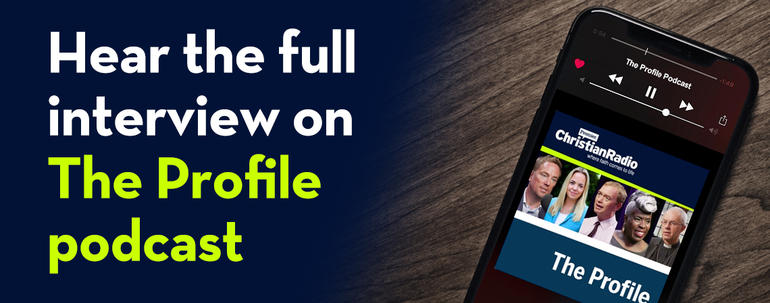
Max Lucado has sold more than 100 million books across 54 languages. Dubbed "America's pastor” by Christianity Today and awarded “The best preacher in America” by Reader’s Digest, the 65-year-old has enjoyed a fruitful career. His writing has been shaped not only into books, but cards, booklets, commentaries, Bible studies, movies and even songs. His daily online video messages, launched at the onset of Covid-19, are engaging more than 13 million per day, and the podcast that he started at the end of July, Encouraging Word, shot straight into the top five Christian podcasts in the UK.
Given the ubiquity of his work and huge audience, I was quite nervous when I sat down to talk to Lucado about his journey of faith. I expected to feel incredibly inferior next to him – but I was wrong. The author is humble and kind, and as we chatted with cups of tea in hand, he began to open up about the difficulties of life in lockdown. Lucado admitted he had found life very surreal and somewhat stressful, particularly at the start of the pandemic. For the first week or so, he was unable to sleep or relax, he tells me. Deciding to practise what he consistently preaches, he realised he needed “to trust and believe that we serve a good God who sits on the only throne in the universe”.
Lucado has been following Jesus since his 20s and is still a teaching minister at Oak Hill Church in Texas, where he has been a leader in some capacity since 1988. Describing a teenage version of himself as “a mess; chauvinistic, a heavy drinker, involved in lots of fights and heading towards a life of trouble”, he met a friend while he was at university who persuaded him to go church. After visiting the church, the pastor convinced Lucado that God could forgive “someone like him” and his future was forever changed. The biblical character of Joseph has been one of his life’s inspirations. He believes the Old Testament character models how to get through the tough seasons of life, a lesson he’s drawing on through the pandemic.
His latest book, You Are Never Alone (Thomas Nelson) was in the pipeline before Covid-19 struck, but given how the crisis has exacerbated an already rampant epidemic of isolation and depression, Lucado hopes the book will be a timely help to readers. “The message of the miracles is the Miracle Worker himself. He wants you to know you are never alone. You are never without help, hope or strength. You are stronger than you think because God is nearer than you might imagine.”
When you began your relationship with Jesus everything changed. Could you describe what happened?
I had to change peer groups. The people I ran around with were pretty rowdy. I tried to be the good influence, but they influenced me more than I influenced them. I realised that, at least at the beginning, I needed to change friends, and it was a pretty dramatic series of events. I sat down with them and said: “I can’t do what we’re doing. I’ve changed my allegiance.” I did my best to tell them about my faith, and then I said: “You’re not gonna see much of me any more.” I found a new group of friends through the church and it turns out that they were all seminarians who were preparing to become missionaries. Through their influence I stayed in college and then entered seminary and became a pastor. It had a profound impact on the trajectory of my life, as we ended upgoing to Brazil to start a church in Rio de Janeiro, where I spent five years.
It was quite a difficult time for you as your dad was diagnosed with Alterior Lateral Sclerosis just before you left for Brazil, but once you felt released by him to go, you found yourself drawn to study Joseph more deeply – could you explain why?
I really would have changed my plans gladly, but I received a letter from him – a beautiful statement of blessing and release. He was a mechanic, he never sat down with paper and pen, but this letter was so precious I’ll keep it forever...He said many things in the letter but the chief of it was that he had no fear of death and that I should go to Brazil to serve God. It was in that season that I began to become a real student of the life of Joseph in the Old Testament because Joseph models how to get through tough winters; tough seasons of life. His entire life, it seems, was a challenge: sold by his brothers into slavery, he ended up in prison for something he did not do. Then he was entrusted with leading the nation of Egypt and, consequently, the whole world through a global famine. But he did so successfully, and there is no indication he ever became bitter. Anger never metastasised into hatred. There is every indication, however, that he believed in the goodness and sovereignty of God. And I think that’s where he found his strength. God took that which was intended to bring him down and used it to build up the kingdom of God.
That’s really an essential teaching. The belief that God is good, that God is sovereign, that he’ll get us through this. We have to hold on to that. There’s so much anxiety in the world right now. Suicide attempts are on the rise, applications for divorce are increasing; there’s much stress and trepidation. God is calling forth a community of people who will trust him, lean into him and believe that he’s going to use this for something good. Our most important decision is to keep our focus on the goodness and sovereignty of God.
Throughout most of Joseph’s life he had difficulty, trial, loss and betrayal. How would you encourage us to do as he did and keep hopeful?
When you read the story of Joseph, you get the impression it happened all before breakfast one morning, because it doesn’t take long to read it. But he had to make that long walk to Egypt, some 450 miles. He was sold into slavery and it appears he was a slave for ten years. He was in prison for over two years. Then he was overseeing Egypt during the seven years of plenty and then the seven years of paucity. It was about 20 years that he was separated from his family. Joseph had an understanding during this time that God was still on the throne. We get this indication because, when he finally was reunited with his brothers, he said: “You meant evil against me, but God meant it for good” (Genesis 50:20, NASB). He believed that God was in the middle of the story. I know that’s easy to say in an interview or a sermon. It’s hard to do in life.
Many are passing through times of great fear. I know many people who’ve lost friends, and so I don’t mean to come across as condescending. It’s a challenge, but it is possible for us to do this. We can keep our faith instead of giving in to our fears. I would encourage people to think about the promises of God. He has said: "Never will I leave you, never will I forsake you” (Deuteronomy 31:6). He never will. He’s here with us. I would also urge people: don’t follow your feelings. They’re not trustworthy. We need to just believe that faith is a fact. We’re putting our faith in God, and let’s remember that what matters most is God’s hold on us more than our hold on him. Sometimes we will let go, but he will not let go of us. And so don’t beat yourself up when you pass through times of doubt or disbelief; God has a hold of you. Think about the promises of God, believing in the fact that he holds you.
You’ve said more people are battling anxiety than ever before. Why is that?
Yes, it’s especially true in the lives of young people. Millennials find anxiety and loneliness to be the two most severe challenges of their lives. How unfortunate that the very season of life in which we should be adventurous and enjoying community is, for many young people, a time of fear and isolation. And this is only further magnified by the current pandemic that we’re facing.
I believe this anxiety comes from three sources. We’re exposed to more news than at any time in history, so we’re constantly bombarded with people’s interpretation of current events. Bad news sells and so we have a lot of bad news being distributed in the world. The world is changing so fast we cannot keep up. And now, with this pandemic, we’re facing things we’ve never faced before. And then there is just a sense of secularism. To believe there is no God and at the same time to live in a fast-changing world that’s facing a pandemic is a recipe that leads to anxiety.
I believe that the story of Joseph is really still apt. We’ll forever be battling anxiety. Joseph models how to believe that God is not only in control, but he’s a good guy. We have many ways that we manage anxiety, and many of them are healthy, but nothing takes the place of a deeply rooted belief in the goodness and sovereignty of God.
As we look forward to a time when lockdown around the world is over, can you see a different future for the Church?
We’re seeing an openness to the gospel that is very encouraging. For example, I was part of a Good Friday service that we posted on my webpage and which had 4.5 million views within 48 hours. That’s stunning. I post daily messages of encouragement: we’re well over 13 million views on those. So I think there’s an openness to what God is doing. Revival is a sovereign work of God that only he can orchestrate, but we’ve been promised that Jesus would bring days of refreshing. He said: “If anybody is thirsty, let them come unto me and drink, and out of that person’s heart shall flow rivers of living water” (John 7:37-38). That’s a message about the Holy Spirit. When we come to Christ and drink, the Holy Spirit flows out of us. We’re going to see that work of the Holy Spirit flow out of the Church. This is certainly my prayer. We have a beautiful window here. And I think it is time for Christians just to be faithful. We don’t need to have a swagger. We need to remain humble, prayerful and trust that our living God is going to use this to call millions of people to himself.
To hear the full interview, listen to Premier Christian Radio at 8pm on Saturday 5 September or download The Profile podcast






























